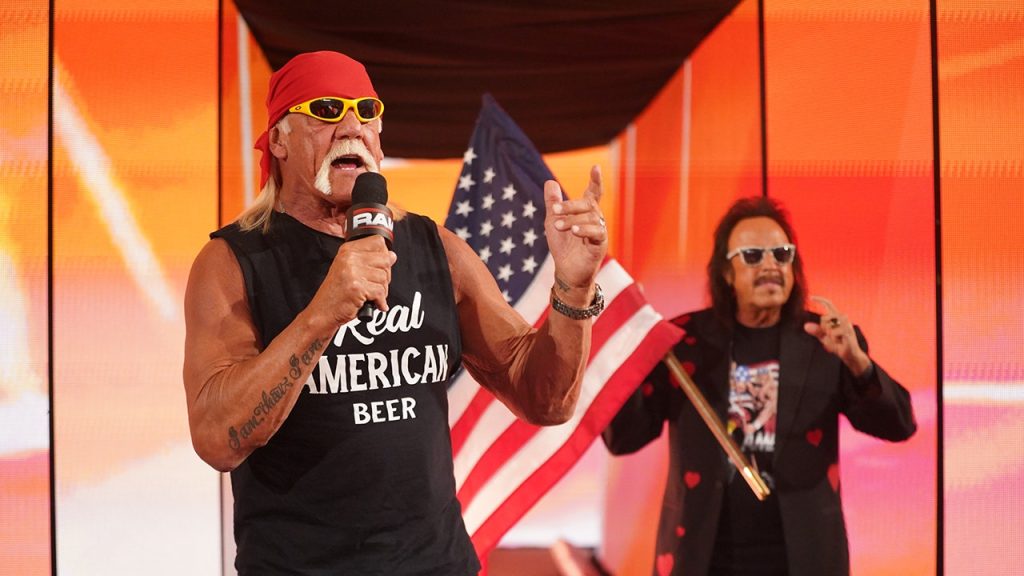The WWE Universe witnessed a controversial return as wrestling icon Hulk Hogan made a special appearance at the Intuit Dome for the Netflix premiere of “Monday Night Raw.” Accompanied by his longtime manager, Jimmy Hart, Hogan emerged to the familiar strains of “Real American,” Hart patriotically waving the American flag. Hogan’s intention was to promote his Real American Beer brand, recently partnered with WWE, but his reception was far from welcoming. The Los Angeles crowd erupted in a chorus of boos, a stark contrast to the adulation he typically receives. After a brief, awkward moment, the 71-year-old Hall of Famer retreated backstage, his promotional attempt effectively derailed by the audience’s resounding disapproval. This incident highlighted a clear divide between Hogan’s legacy and the current sociopolitical climate, setting the stage for a heated debate among wrestling fans.
The negative reaction within the Intuit Dome reverberated across social media, sparking a firestorm of opinions. While some echoed the live audience’s sentiment, many fans defended Hogan, attributing the boos to political bias. Supporters rallied behind “The Hulkster,” citing his legendary status and emphasizing the need to separate personal beliefs from professional accomplishments. They argued that his contributions to wrestling should outweigh any perceived political missteps, urging fans to prioritize respect for a legend. Some even suggested that the California crowd’s liberal leanings fueled their negativity, underscoring the increasing intersection of politics and entertainment. This digital battleground further illuminated the complex and often contentious relationship between a celebrity’s personal life and their public persona.
Hogan’s outspoken support for Donald Trump during the presidential election cycle had undoubtedly contributed to the polarized reception. His prominent presence at Trump rallies, including a high-profile appearance at Madison Square Garden, cemented his political alignment. In subsequent interviews, Hogan elaborated on his rationale, citing the assassination attempt against Trump as a turning point. He framed his support as a moral imperative, transcending business considerations. This explicit political stance, while potentially alienating some fans, resonated with others who shared his views, adding another layer to the already complex dynamic.
The Los Angeles appearance stood in stark contrast to Hogan’s reception just months earlier at the “Raw” anniversary show in Philadelphia. There, he had received a warm welcome, a reminder of his enduring popularity among certain segments of the WWE fanbase. This contrasting reception further highlighted the geographical and political divisions within the wrestling community. The Los Angeles incident underscored how public perception of a figure like Hogan could shift dramatically depending on the audience and context, illustrating the challenges of navigating a celebrity persona in a politically charged environment.
The incident also brought to light Hogan’s checkered history with WWE. His relationship with the company has been marked by several separations stemming from various scandals, including a highly publicized racial controversy. While WWE eventually reinstated him, the incident undoubtedly left a lasting impact on his public image. His recent political pronouncements further complicated his relationship with the organization and its diverse fanbase. This historical baggage contributed to the mixed reactions he received in Los Angeles, demonstrating the enduring consequences of past actions.
The Hulk Hogan episode at the Intuit Dome became a microcosm of the larger cultural and political divisions within contemporary society. It illustrated how entertainment figures can become lightning rods for controversy, particularly when they express strong political views. The incident sparked a fervent debate about the extent to which fans should separate an artist’s personal life from their professional achievements, highlighting the complexities of fandom in a politically charged era. While some fans remained steadfast in their admiration for Hogan, others found his political stance irreconcilable with their values. This clash of perspectives reflected the broader societal struggle to reconcile personal beliefs with public figures’ actions, underscoring the challenges of maintaining a unified fan base in a fragmented world.

